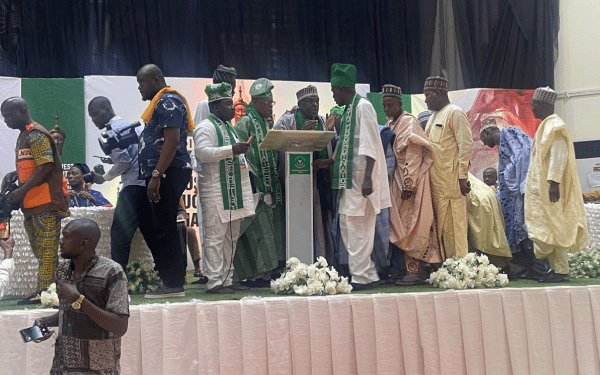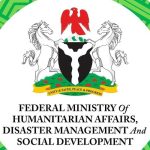In Southwestern Nigeria, historical farmer-herder conflicts were uncommon. However, environmental degradation and escalating violence in the North have pushed herders southward. Over time, competition for resources, such as land for pasture or agriculture, has intensified tensions between these groups.
The International Crisis Group reports that since January 2018, approximately 300,000 people have been displaced due to conflicts between farmers and herders in the region. There is hope for an end to these recurring clashes, as a Memorandum of Understanding (MoU) was signed on April 18, aiming to foster peaceful coexistence between Miyetti Allah Cattle Breeders Association of Nigeria and the South West Commodities Farmers Organization.
During a summit in Ibadan, a Memorandum of Understanding (MoU) was signed, which brought farmers and herders in the South West region together to collaborate for the mutual benefit of both parties and Nigeria. In a conversation with Daily Trust, Olusegun Dasaolu, the coordinator of the Southwest Commodities Farmers Organization, highlighted that farmers and herders are the key stakeholders in the crisis.
He mentioned that various attempts to ensure peaceful coexistence had been made by the federal government, but these efforts were not successful. Dasaolu considered the current MoU as a significant step in the right direction, as it directly involves the critical stakeholders. He believed that these stakeholders are best positioned to find a lasting solution to the ongoing crises. However, he also emphasized the importance of government support for the success of these peace initiatives.
Dasalolu stated, “This significant step will contribute to resolving the food crisis by enabling farmers to regain confidence in their work, leading to increased agricultural production. This development aligns well with the Renewed Hope Agenda of Asiwaju Bola Tinubu.”
He pointed out the absence of a comprehensive database of authentic herders as a major hurdle in their collaboration. This issue will be addressed in future engagements with MACBAN (Miyetti Allah Cattle Breeders Association of Nigeria). The presence of indigenous herders, who have grown up within the system, contrasts with the intruders who often bring evil intentions. A well-maintained database would aid in crisis management by identifying strangers and helping to differentiate between locals and outsiders. Tracking individuals involved in criminal activities becomes more manageable when their movements can be traced through a database. Furthermore, fostering a harmonious relationship between farmers and herders will enable them to recognize each other and work together to address shared concerns.
In the six South West states, laws have been enacted by the houses of assembly to manage conflicts between farmers and herders. However, these laws have not been implemented. Implementing these laws would provide guidelines for both parties to follow in their respective professions.
Dasaolu, a key representative of the South West farmers, expressed their commitment to the success of the MoU. He expressed confidence in MACBAN’s ability to aid in identifying and registering genuine herders.
Dasaolu further explained that the signing of the agreement is just one step towards achieving long-term food sustainability. Both parties will engage in regular meetings to ensure a harmonious working relationship and promote a smooth collaboration. Othman Ngelzarma, the National Chairman of Miyyeti Allah, recognized the agreement as a chance to create a roadmap for securing the safety of both farmers and herders in the region.
He emphasized that the Fulani community is well-known for honoring agreements. Once an understanding or a pact is reached, they typically adhere to it. Any breaches in the agreement usually stem from the other party involved.
He attributed the hostile stance of the regional political leaders towards herders to misinformation. Numerous town hall meetings and discussions with the Ondo State government have taken place to address the crisis. During the formation of Amọtẹkun, Governor Akeredolu was influenced by unconfirmed information provided by his colleagues, which led to several statements discrediting the Fulani community in the state.
Despite these issues, Fulani residents in Ondo State continue to live peacefully. It has been confirmed that kidnappings are not exclusive to the Fulani; other groups are also involved in such activities. Some Yoruba criminals from Kwara State disguised as Fulani, committing numerous atrocities before being caught. It is essential to note that criminal elements exist within every tribe, including the Fulani community.
In Ekiti State, the speaker mentioned working closely with Governor Fayose to establish a committee comprising critical stakeholders from the state to the local government levels. This committee played a significant role in maintaining peace during Fayose’s tenure. Fayose directed pastoralists to stay within the game reserve, get registered with the local government, and adhere to the registration process.
Furthermore, Fayose signed a law that held pastoralists accountable for any damages caused by their cattle on farmlands, mandating them to compensate for the destruction and face legal consequences. Similarly, farmers would be held responsible for killing Fulani cattle. The speaker highlighted their active involvement in these processes in Ekiti State.
Engagements with Governor Akeredolu of Ondo State were also discussed, but the speaker claimed that registering Fulani or implementing mechanisms for this purpose were never brought up during their interactions. The speaker expressed disappointment in the allegations against Fulani pastoralists, calling them mere fabrications and the imagination of people with personal grudges against the community. Unfortunately, some media houses contribute to the spread of these falsehoods, tarnishing the image of Fulani pastoralists.
Ngelzarma highlighted that this development has fostered unity among the pastoralist community, as they now recognize the need to collaborate effectively to identify and tackle any problematic elements within their ranks.
The Memorandum of Understanding (MoU) between cattle breeders in the South West and herders signifies a commitment to work together for the benefit of farmers and the advancement of agriculture. This collaboration aims to resolve conflicts among stakeholders in a peaceful manner. The summit served as an eye-opening experience, paving the way towards finding lasting solutions to the challenges faced by farmers in the South West states.
Moving forward, their first step involves identifying genuine herders and farmers in the South West region and enhancing their connections to ensure better cooperation and understanding.
Both Ngelzarma and Dasaolu emphasized the significance of governmental support in achieving their objectives.
The Southwest Director of the Federal Ministry of Agriculture and Food Security, Abimbola Akeredolu, viewed the MoU as a symbol of unity between the herders and the South West region, aiming to enhance food production and sustainability not only in the South West but throughout Nigeria. Akeredolu also advocated for the continuous integration of technological advancements in agriculture to bolster support for farmers and improve food production.
Additionally, cassava farmer Bolarinwa Joshua, who experienced the destruction of his farmland due to Fulani herdsmen, expressed the suffering endured by farmers as a result of herders’ activities. He expressed hope that the recent developments would help resolve the conflicts between the two groups.





